Chapter 1/X:
நல்வரவு (Welcome)
A Conversation with Kalpana Shivaramakrishnan by Aditi Shivaramakrishnan
One of my favourite writers, Durga Chew-Bose, has said: ‘The one way of identifying myself that always has felt the truest is as a daughter.’ When I read this, I realised that indeed, I’d always felt this way. In her essay collection Too Much and Not the Mood, she also describes her experience as a child of immigrants as being ‘from here but also … from there too’.
My parents grew up in Mumbai, India, and married in October 1987. I was born there in March 1989. My father got a job in Singapore as an IT professional in a multinational corporation and started making trips here from October 1989 before moving here permanently in April 1990. My mother and I arrived soon after, on 1 May 1990. My sister was born in 1992.
As the child of economic migrants – by choice – to Singapore, who has benefited from systems here, my preoccupation is not so much with the impact of my parents’ decision on my life, but theirs.
In this conversation held in a mix of English and Tamil, my mother Kalpana Shivaramakrishnan and I discuss her migration to, early experiences of, and current feelings about Singapore.
Aditi: When you and Appa got married, had you already discussed moving to Singapore?
Kalpana: There was absolutely no intention of us coming to Singapore. I had no clue I would even travel outside the country. I’d never travelled abroad. It was always within India—specifically to South India.
When I got engaged, I knew we would be moving to Kolkata. Nobody from our family had ever been there before. My father asked if I was ready [to go], and I said, OK. After our engagement, he sent ahead all my cooking vessels; they had to go by train. If you asked me now, I would’ve thought twice about it but at age 21…
Aditi: How was your time in Kolkata?
Kalpana: Mumbai is so happening. Kolkata was a total contrast. It was a very sleepy city then, though not anymore. People said it would grow on you.
[But] I wasn’t used to winter. It would be dark by 4.30pm. In Mumbai, life only starts at 4.30pm. That’s when you go for walks, eat bhel puri at 7pm, and come back gossiping with your friends.
I wasn’t working either. So I was like, what have I signed myself up for? But I had heard that Kolkata is safe for women. Kolkata was one of the first cities in India to have an underground metro, which was very clean, and with Rabindra Sangeet playing, which was beautiful. I missed home, but luckily my in-laws [often] visited and eased me into life there.
Aditi: So did you fly to Kolkata?
Kalpana: No, we took a train.
Aditi: Was your first flight ever to Singapore then?
Kalpana: No, we went to Goa with a gift voucher we received. I was pregnant with you then. So that was my first flight ever. But the first international flight I took was to Singapore.
Aditi: When did the topic of moving to Singapore first come up?
Kalpana: In mid-1989 Appa said there might be a chance to move to Singapore for work. But you were very young then. Moving to a new city with a baby didn’t make sense, so Appa went ahead. I stayed on in India with you.
Aditi: What were your initial reactions?
Kalpana: I liked the idea. We had heard so much about Singapore…
Aditi: That was going to be my next question. Did you already know anything about Singapore?
Kalpana: The cleanliness.
Aditi: From whom did you hear this?
Kalpana: Singapore’s cleanliness is well-known all over the world. If you litter, you will be fined.
Aditi: I mean, back then, what were the sources to hear this?
Kalpana: Through friends. I didn’t know about Singapore’s safety then. It was initially a three-year stint [for Appa]. So I always thought I’d go back [to India]. Everyone asked how I’d manage with a small baby; it’d be so difficult in a foreign country. I don’t know. Something made me say yes.
Aditi: You were adventurous.
Kalpana: Yes, very adventurous.
Aditi: So when you knew you’d move to Singapore, did you do any further research?
Kalpana: No, we didn’t have any resources for research. I always feel [that] the less you know, the better.
Aditi: That’s the difference between then and now.
Kalpana: Yes, now even if your mind says don’t Google, you Google.
Aditi: Since Appa came here first, did he provide you [with] any further information? Over the phone, via photos, etc.
Kalpana: Yes, he always used to send lovely photos by mail, showing the greenery of the city. The cleanliness, the escalators…even escalators were a novelty to me. The first time I climbed on one with you, I thought it was so cool. The amount of places to visit, as well, and the ease with which one could travel from place to place, like via the air-conditioned MRT. In Mumbai, train travel is not easy during peak hours.
Aditi: How was your flight to Singapore?
Kalpana: There was another person from Mumbai who had relocated to Singapore for a job at the same company as Appa. His wife and their son came with us on the flight. We flew on Swissair. That was such a great experience, very novel.
Aditi: After you landed, what was your first impression of Singapore?
Kalpana: I was totally zapped by the airport. I’d never seen a place like this in my life. It was so beautiful. The best part was Tamil being a language [used] here. I was taken aback to see Tamil writing, like நல்வரவு (Welcome). And the air-conditioned cabs. The moment we got out of the airport, we zipped off in an air-conditioned cab.
Aditi: Do you remember what you first saw, felt, heard, tasted…?
Kalpana: In our first three months here, we stayed in a very centrally located serviced apartment provided by the company [Appa worked for]. Appa had a lot of work to do so he gave me some money and said ‘enjoy’. I was totally taken aback by The Centrepoint [a shopping centre]. I went to Mothercare for the first time.
Aditi: That was going to be my next question – whether you spent a lot of time at home in those early days.
Kalpana: I got home from the flight, ate, and started exploring the same evening! I spent so much time in Mothercare. I'd never seen a shop like this, exclusively for kids. You must keep in mind, I’m talking about the 1980s, not present-day India. I shopped so much for you, not even knowing the prices. I wasn’t comparing currencies yet. I felt a very happy mother. And then I bought a lot of plum cakes and chocolates from Cold Storage.
Aditi: Did you feel homesickness for India?
Kalpana: I felt very bad that only I was experiencing all this, and that my family wasn’t getting to see it. We couldn’t even talk on the phone for long, so I used to write long letters – aerogrammes. [My mother] Ammama used to write in Malayalam because she could express herself better. She would tell me to read them to Appa. I used to regularly send letters to my friends too. Later, my parents made a visit. Ammama came for your second birthday. She travelled by herself!
Aditi: When did we move from the serviced apartment to Serangoon Road?
Kalpana: After the first three months, we had to find our own place. We finally came to Serangoon. We asked the security guard if there were any Indian families in the block and he pointed us to a unit.
Aditi: What were some activities we did as a family?
Kalpana: We had a friend who lived in Clementi so we used to sit on bus 66 or 97 all the way there. I even used to wear sarees when going visiting. You used to love bus rides. We would ride different routes and alight at [various] neighbourhood markets, where we would buy strawberry milkshakes from McDonalds. You used to struggle with the straw because the drink wouldn’t come up. You would also sit on the 20-cent rides. Then we would come back, very happy with the day.
We visited Haw Par Villa, the Singapore Zoo, Jurong Bird Park, Sentosa, Bishan Park. We visited temples too, and Serangoon Road. We went to P. Govindasamy Pillai [PGP] Store. It was a provisions shop near where Jothi Store and Flower Shop is now.
Aditi: Did ‘Little India’ feel like India, or…?
Kalpana: Yes, yes, definitely. We used to feel very at home. Mainly the smells and the eating places would bring back memories. We used to go to Komala Vilas for thosai and filter coffee. We used to just walk there and return home as it was nearby. We would buy lots of sarees as gifts as well.
Aditi: It’s funny to hear of buying sarees from here to send back to India.
Kalpana: Singapore’s ‘butter silk’ sarees used to be so popular. We have bought so many to give as gifts. As well as Lux soap, Yardley powder, nuts, Cadbury’s chocolate…mostly from Mustafa and PGP also.
Aditi: When your parents and in-laws visited from India, did you feel a responsibility to show them around, and make them feel at home?
Kalpana: Not responsible but very glad, so happy to show them around. Ammama liked sitting by the pool, which reminded her of her village’s kulam (pond) in Kerala. We used to go on MRT rides, to temples…at some point Ammama also went to the temple by herself. It was nice to show them around and show the little country which was so clean, and to take lots of photos.
We would print three sets of photos – one for us, one for my family and one for Appa’s family, and go to Bras Basah post office to send them by mail. After a while, we started to just print the best photos to send as sending the whole [film roll of] 36 was expensive.
Aditi: When and how did our move from Serangoon to Yio Chu Kang come about?
Kalpana: After three years, we were given a choice to return [to India] or stay on. We had a big discussion about [whether we wanted to] stay here long-term. We had your sister by then as well. But seeing the way things were [in Singapore] – safety for girls, the various conveniences in this country, we decided to put down our roots here. So Appa became a permanent employee [of the company he worked in].
That was a big decision we made. We had to find our own place. We started househunting and looked at many flats. We thought of staying on in Serangoon but the bank loan didn’t work out. We didn’t sleep the whole night because we loved that place so much.
But everything happens for a reason. [Eventually] we saw this flat [we’re living in now], which was so nice. I had always wished for a home like this, and somehow that dream came true when I saw this flat.
Aditi: How did shifting from Serangoon Road to Yio Chu Kang make a difference in your experience of Singapore?
Kalpana: It was totally different – [the neighbourhood was] much more open, and we had lovely neighbours with kids of similar ages to you. By then, we also had a group of friends forming. Back then, people would receive parcels from home, with mangoes, halwa…[My father] Thatha sent mangoes for us via his friend’s sons, who were based in Singapore. So Appa went to their house to collect the mangoes, and then we became friends. One of your birthdays was coming up, so we invited them and their kids as well. Other than that, I was also very busy, with two kids, and with Appa working long hours.
Aditi: What are your favourite places and activities in Singapore now?
Kalpana: At this age, my favourite places are the gardens and temples. I’d love to go walking by the city centre, like Gardens by the Bay and Marina Bay. The whole of Singapore is my favourite. We also got a car, which made travelling easier. Pasar malams were another of my favourites.
Aditi: Are those different from India’s night markets?
Kalpana: In India, every road is a night market! But also, India’s too big a country to compare.
Aditi: Are there still things about Singapore you feel are unfamiliar, that you don’t understand?
Kalpana: The variety of food people eat…and the shooting of crows. I grew up where crows are revered; my mother offers rice to them daily. I agree that they can dirty some areas but I still can’t understand shooting them. I was also fascinated by the Hungry Ghost Festival, which I’d never seen. We [Hindus] do have something similar – the Aadi month, in which ancestors are worshipped, and we don’t do house moves, marriages then…I was amazed by everything offered for the afterlife when someone dies. We did the same too for Thatha [so he could] have a good afterlife, except we don’t burn the items.
Aditi: If you could change something about Singapore, what would it be?
Kalpana: I feel people can loosen up and complain less. It’s a lesson for me too. It’s also good [that] people’s mindsets have opened up, and parents are realising [that] there isn’t only one way to succeed in the education system. There are other avenues besides studying. But it takes a lot of time for Indian parents to convince ourselves [that our kids] don’t have to become engineers or doctors. Our whole lives are based on how our kids do. But overall, it has been a good 30+ years.
I revisited Durga Chew-Bose’s words as I put together this piece. In this interview with Abigail Bereola, she states how her parents’ stories don’t belong to her; she acknowledges ‘respecting their individual lives that are running alongside their children’s. […] I understand that they have an entirely complex and separate experience of what it is to be a person. And I think my relationship to them is a very equal mix of curiosity, but without prying.’ In another interview, she adds, ‘No matter how close you are to your family, you still don’t know how your daughter interprets the world.’
I realise that my attempts to bridge this gap mirror Chew-Bose’s approach of venturing questions about details:
‘When my parents are telling me anything, I push for all those little details, but in terms of the deeper emotional stuff or choices that they made, even, I really believe that those are theirs to share and tell me when they feel the time is right. Or never tell me.’
As this piece’s title indicates, I am hopeful that this will be the first of many more dialogues about what Singapore means to both me and my mother, and what we mean to each other.
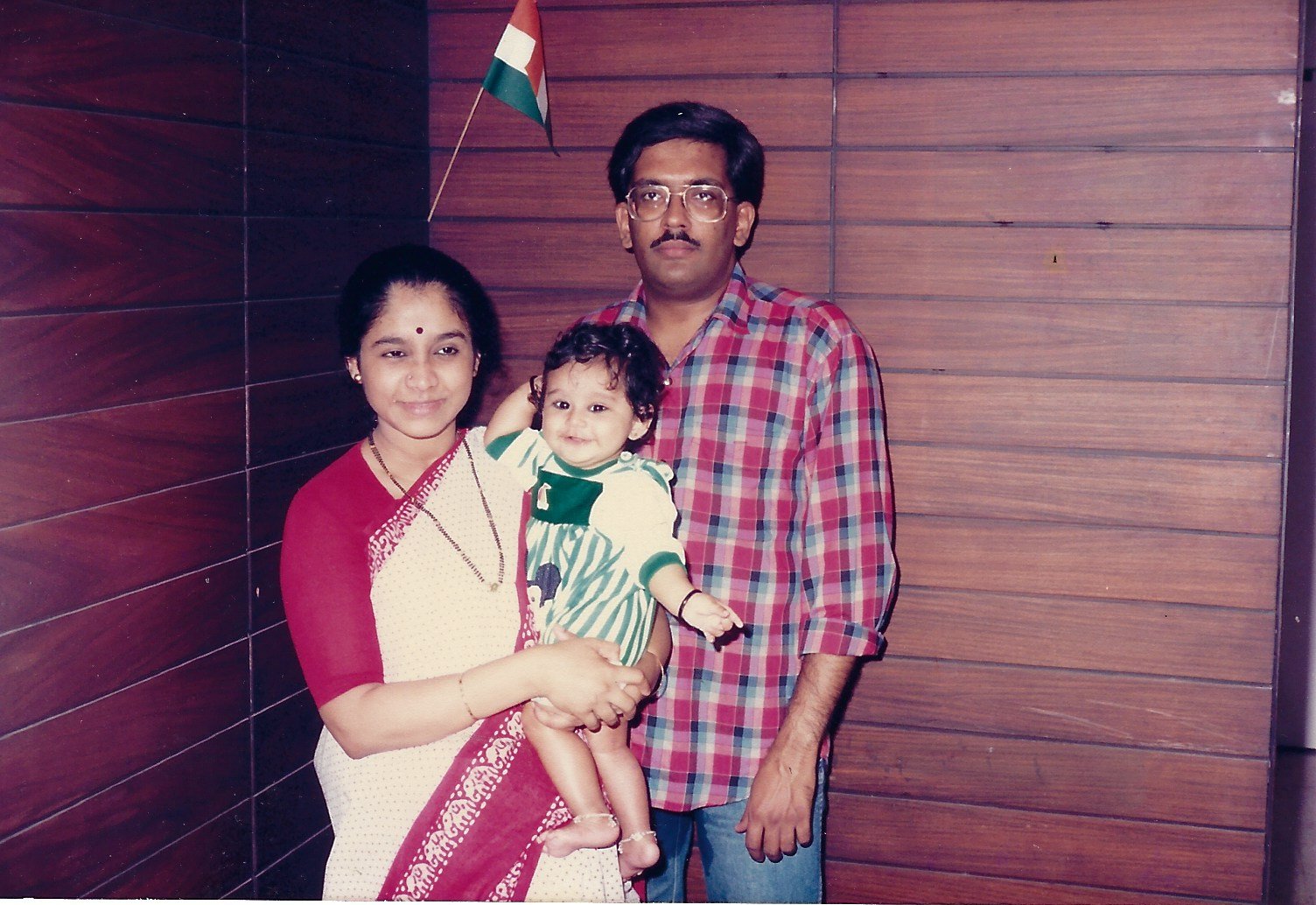
My parents and me in Mumbai. The Indian flag, partially obscured, is seen in the background.
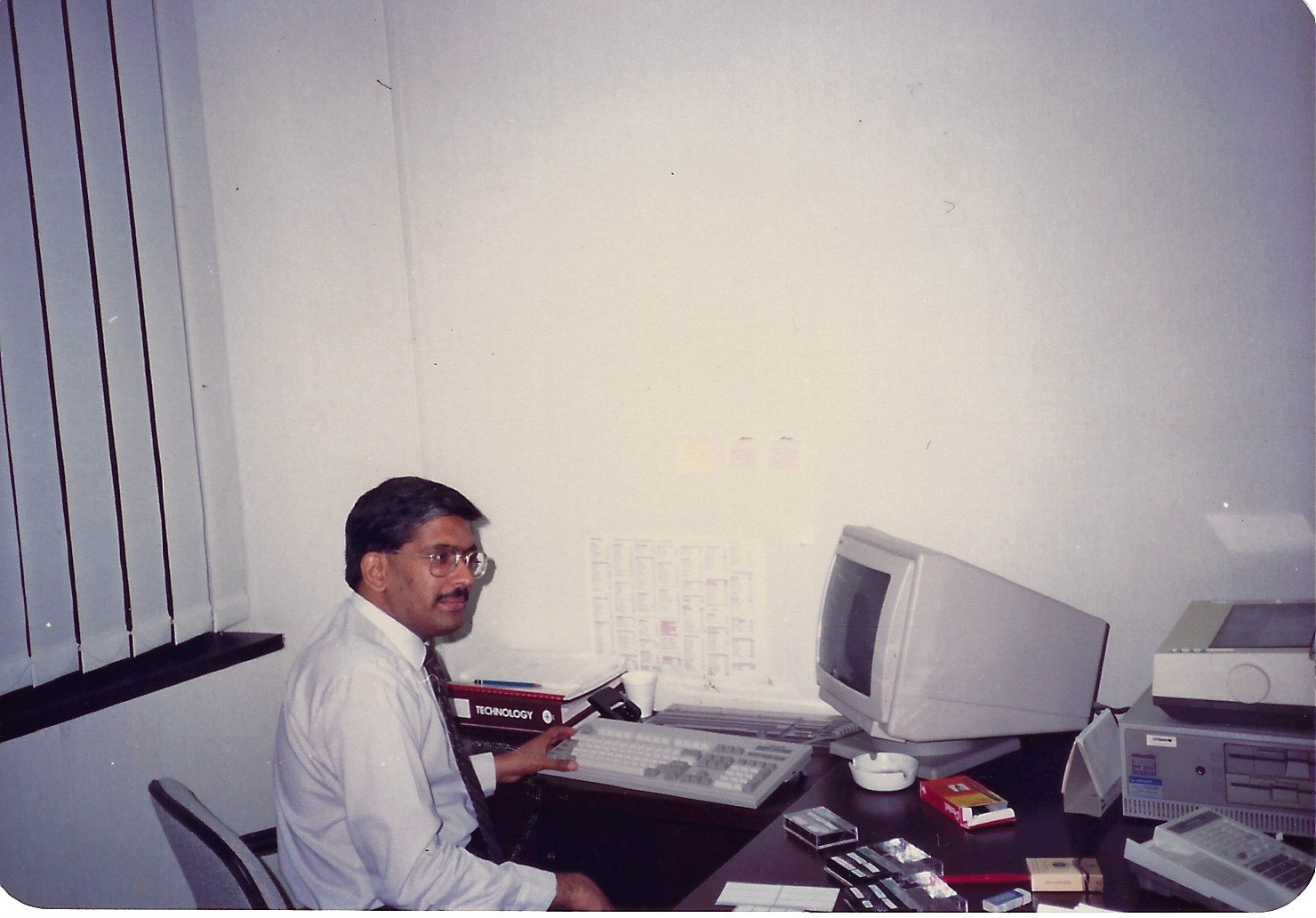
My father got a job in Singapore as an IT professional in a multinational corporation, and arrived here in 1989. He is seen here in his workplace in Southpoint. He identified the computer as an Olivetti.
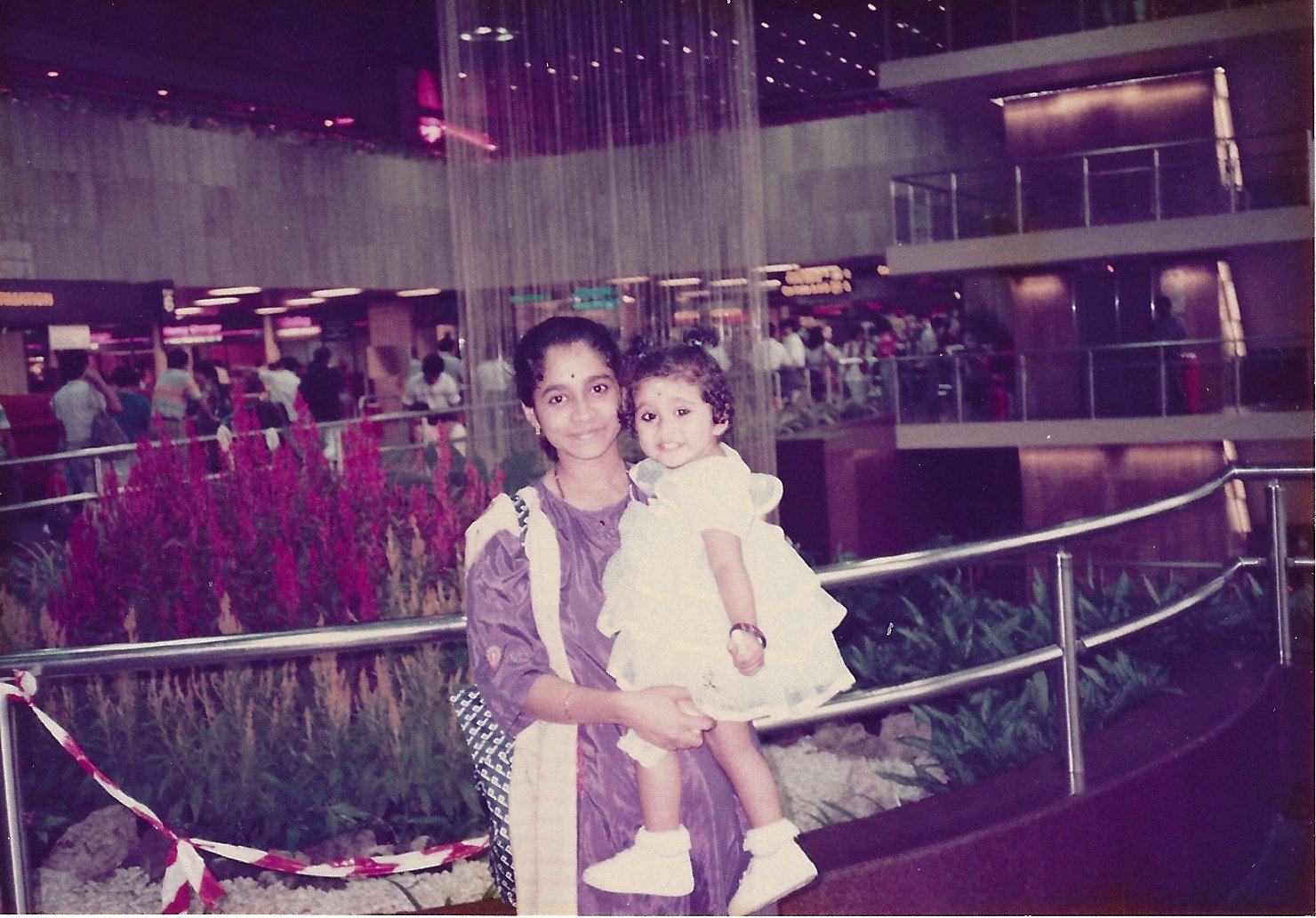
My mother and me at Changi Airport. This was not from the day we arrived in Singapore, but another outing to the airport.
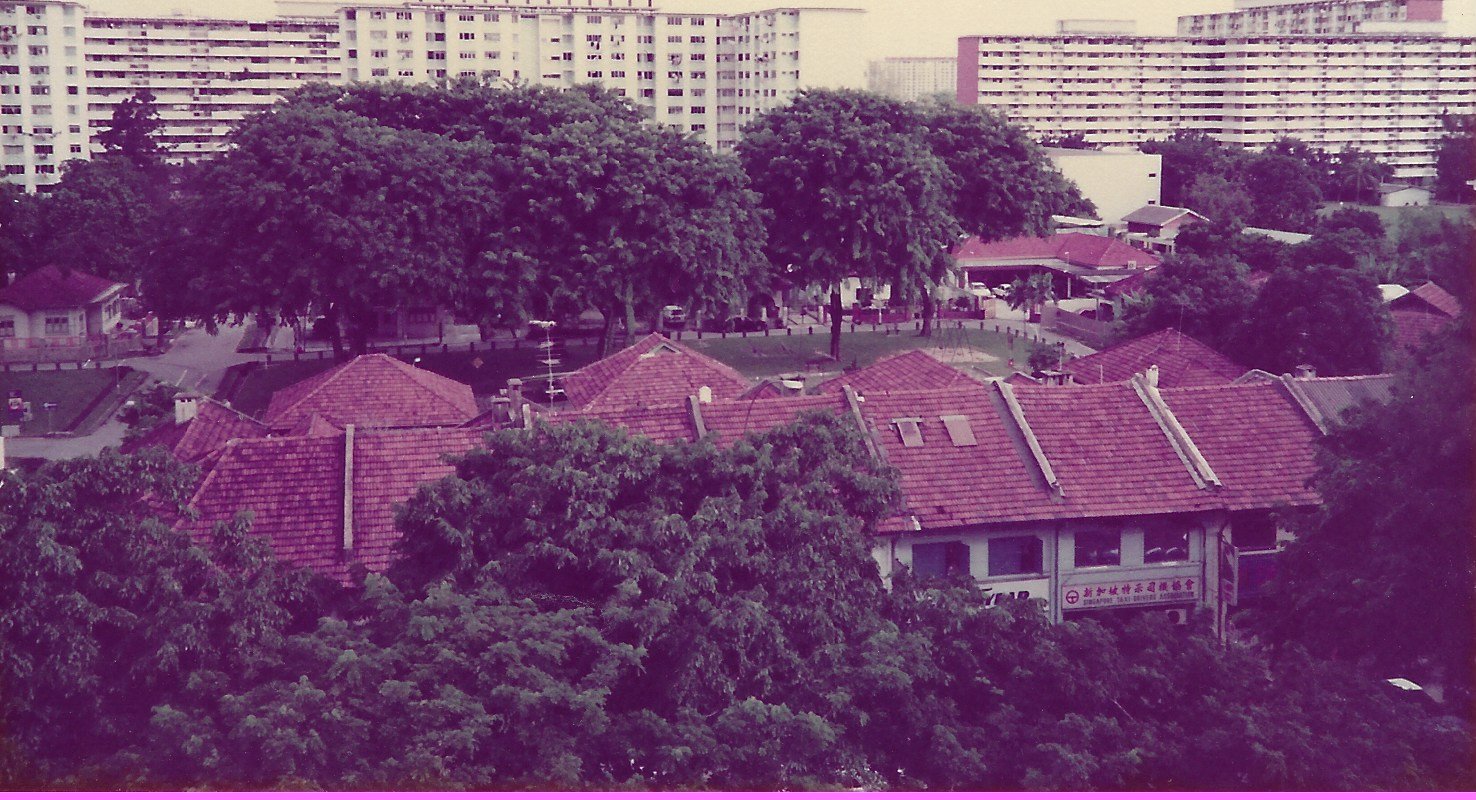
The view from our sixth floor flat along Serangoon Road (closer to Bendemeer, than to Little India).
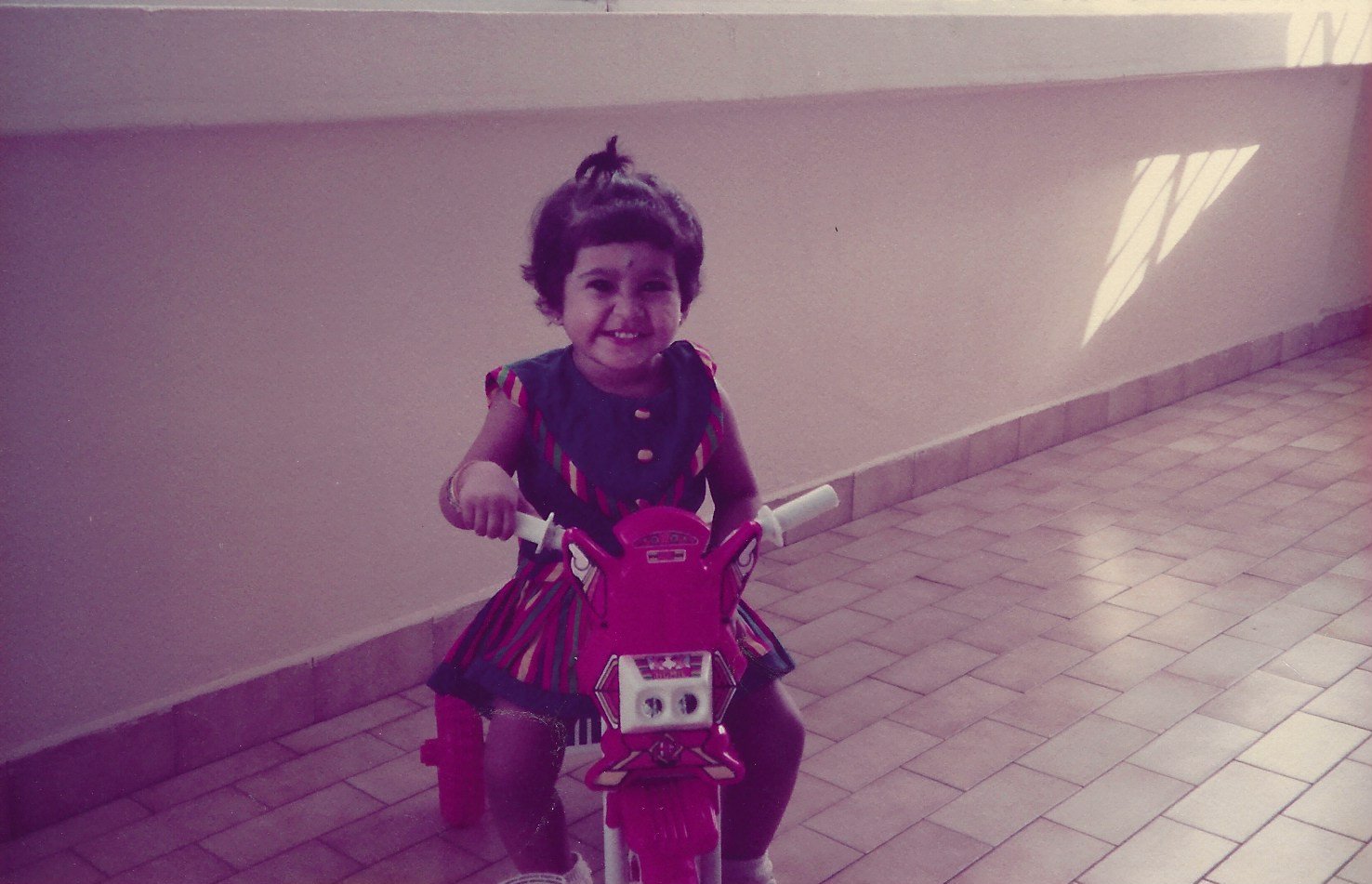
The Serangoon flat had a long, spacious balcony in which I would ride my tricycle.
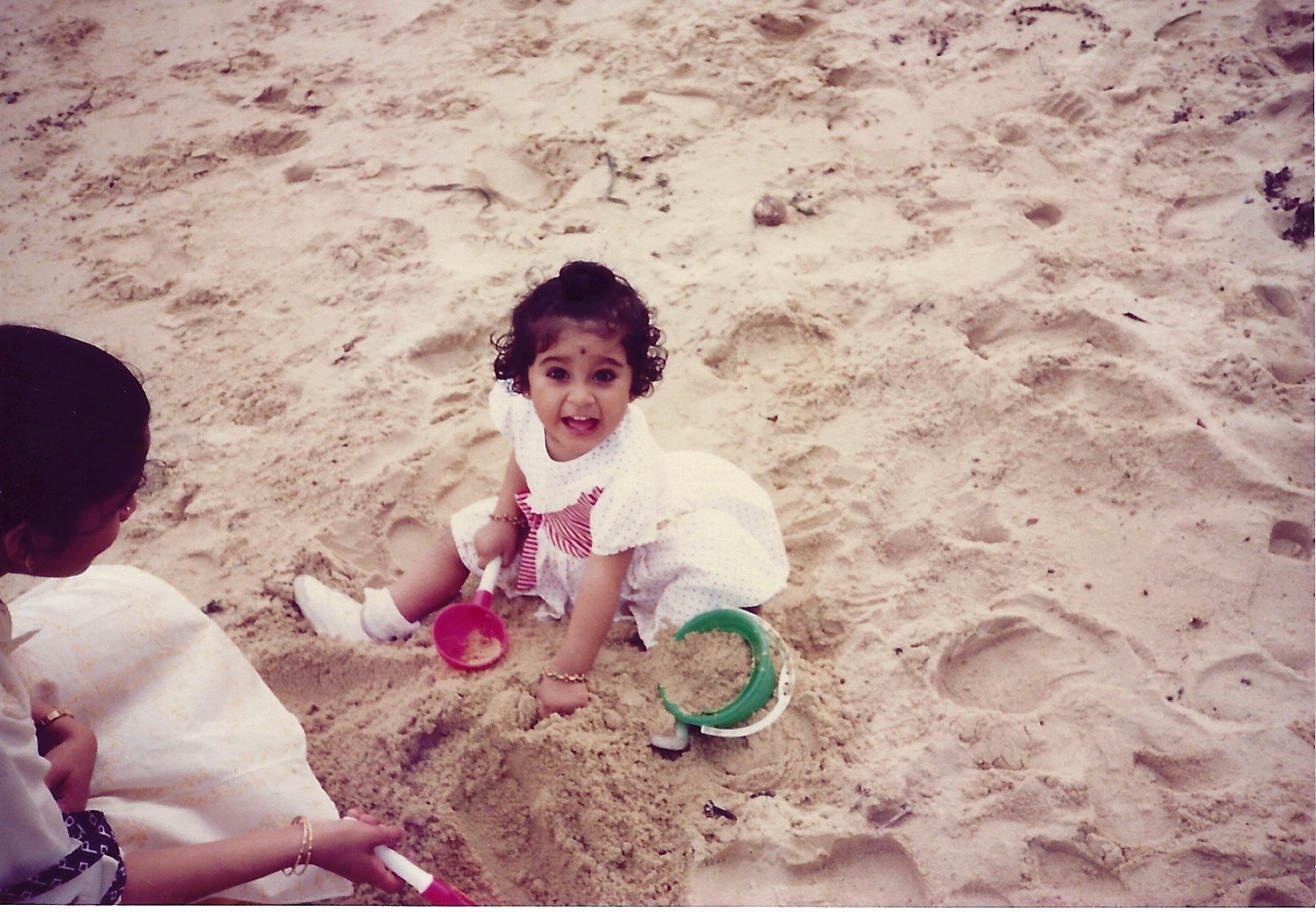
In our early years in Singapore, we visited many spots such as the beach.
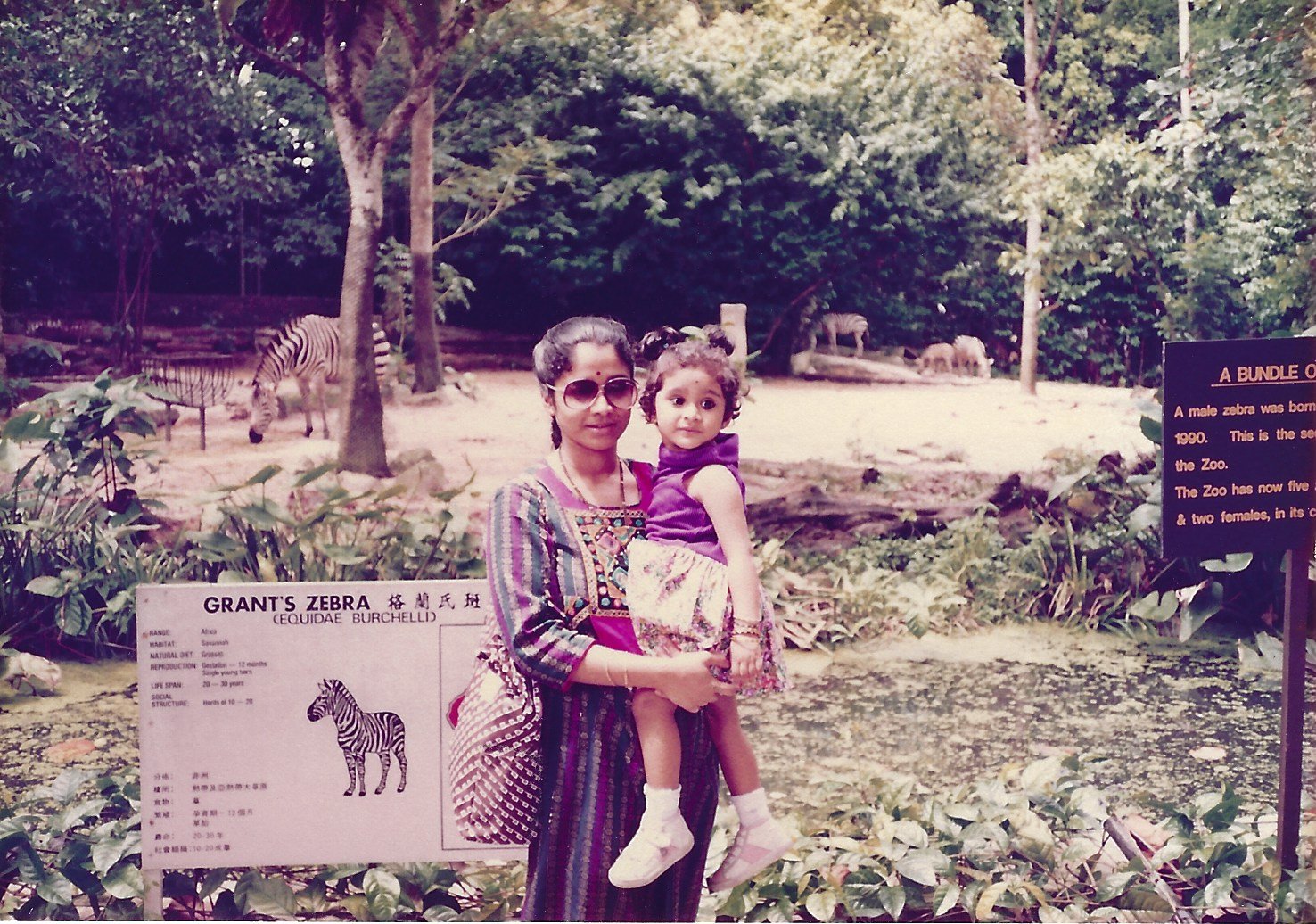
We also have quite a few photos from our visits to the Singapore Zoo.
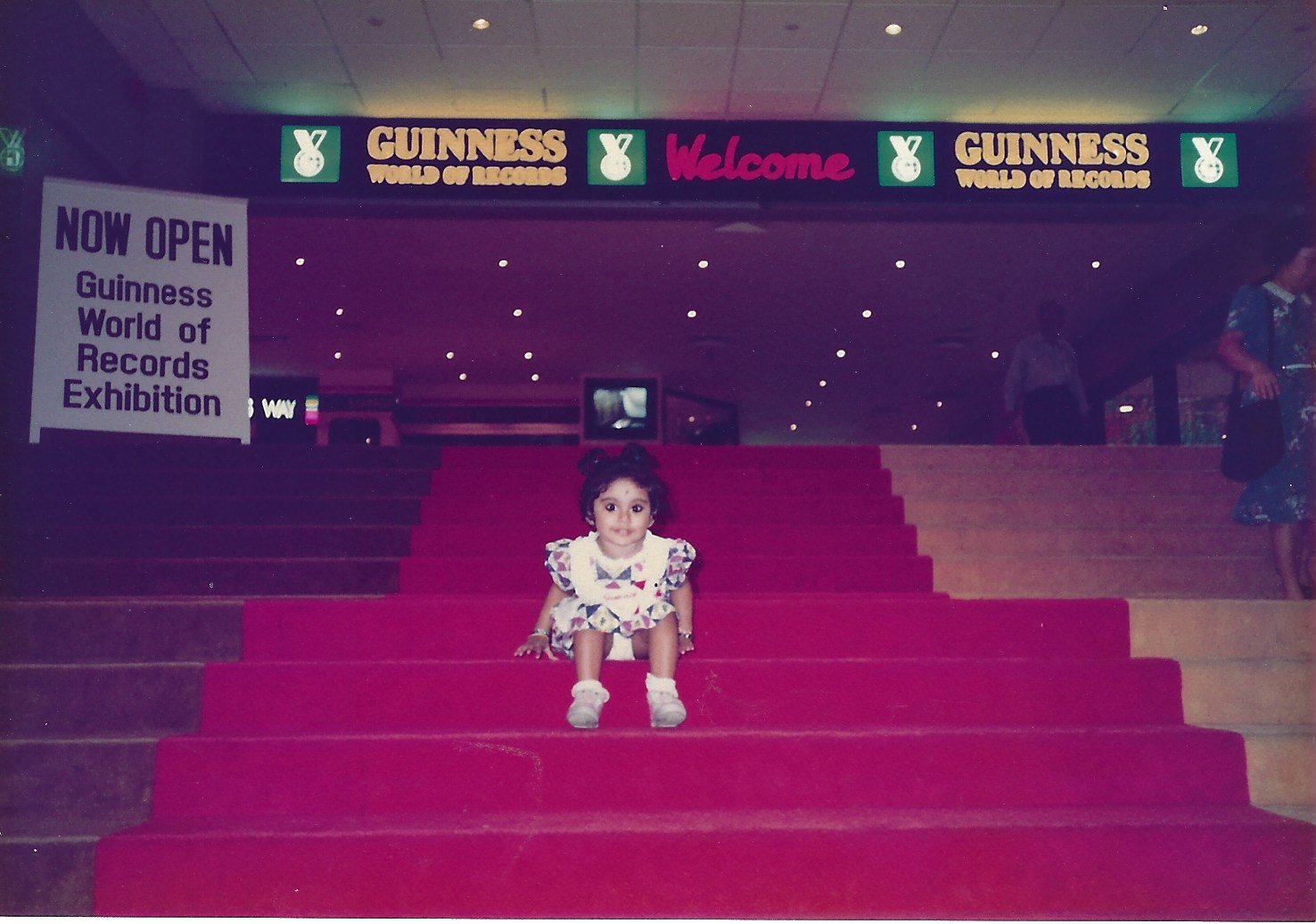
I do not recall the Guinness World of Records in Singapore, but there are several photographs, dated 1990-1992, of this attraction on the National Archives of Singapore’s website.
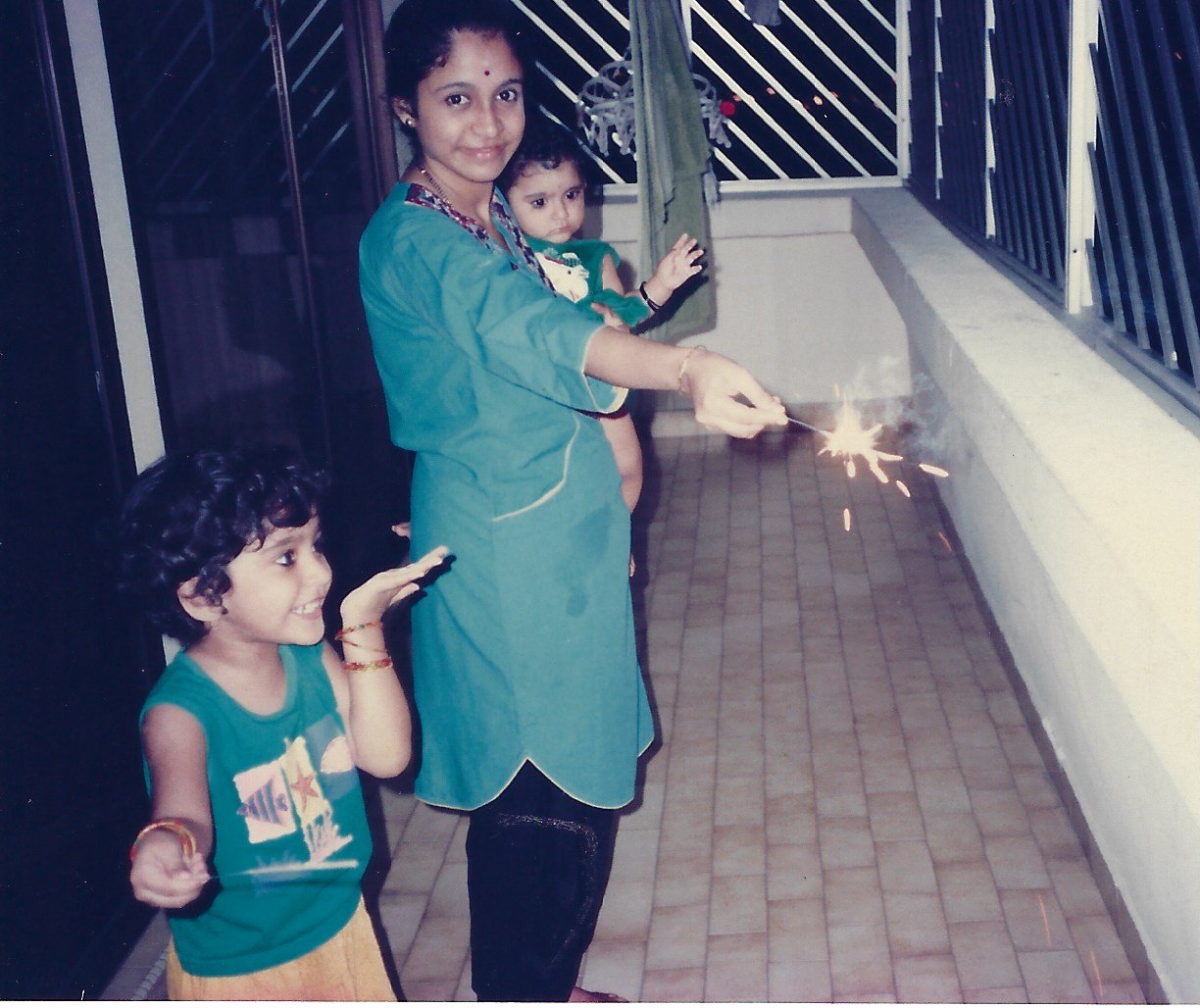
My sister was born in February 1992. Here, my mother, sister and I are celebrating Deepavali with sparklers on the balcony of the Serangoon flat.
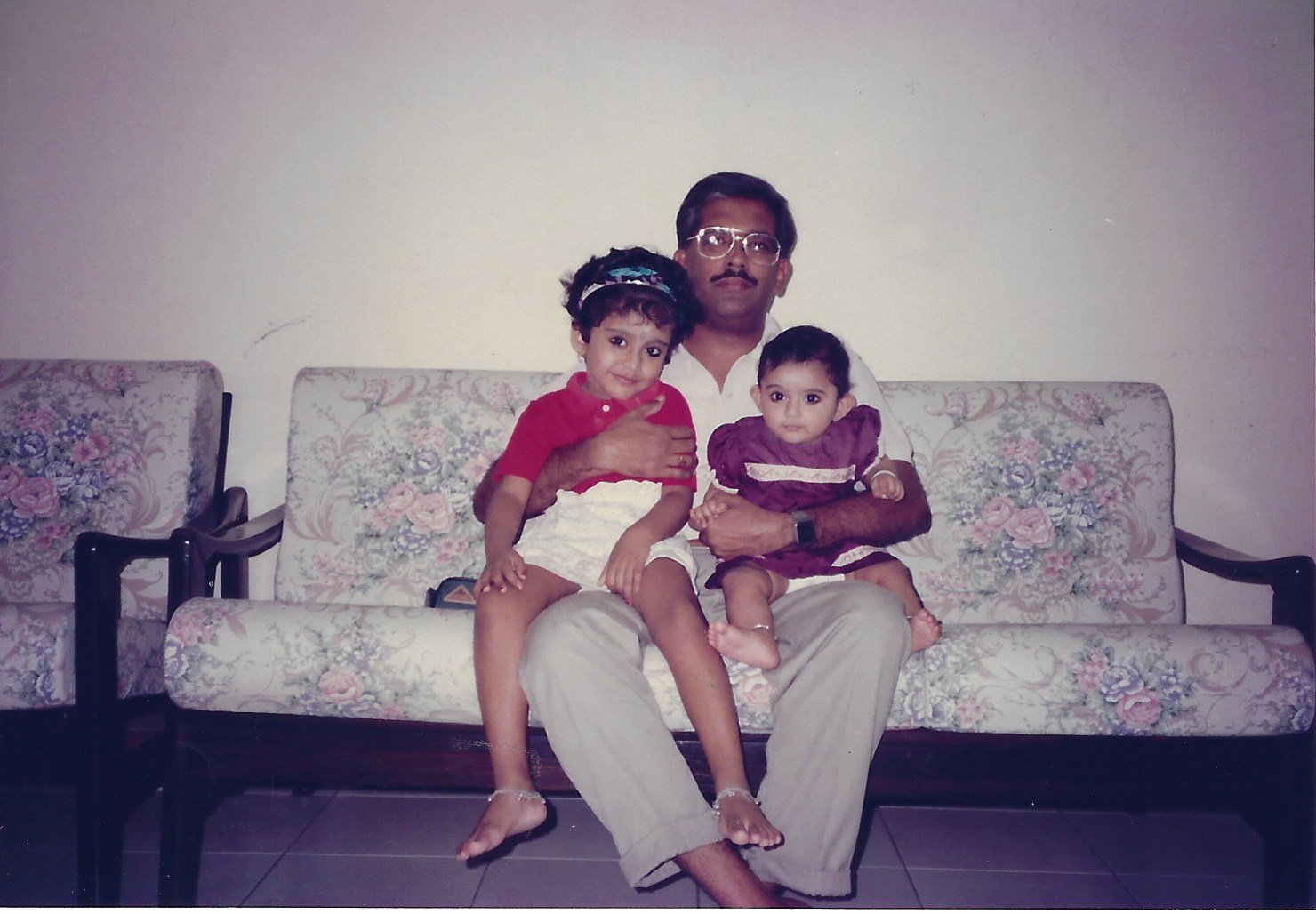
My father with my sister and me.
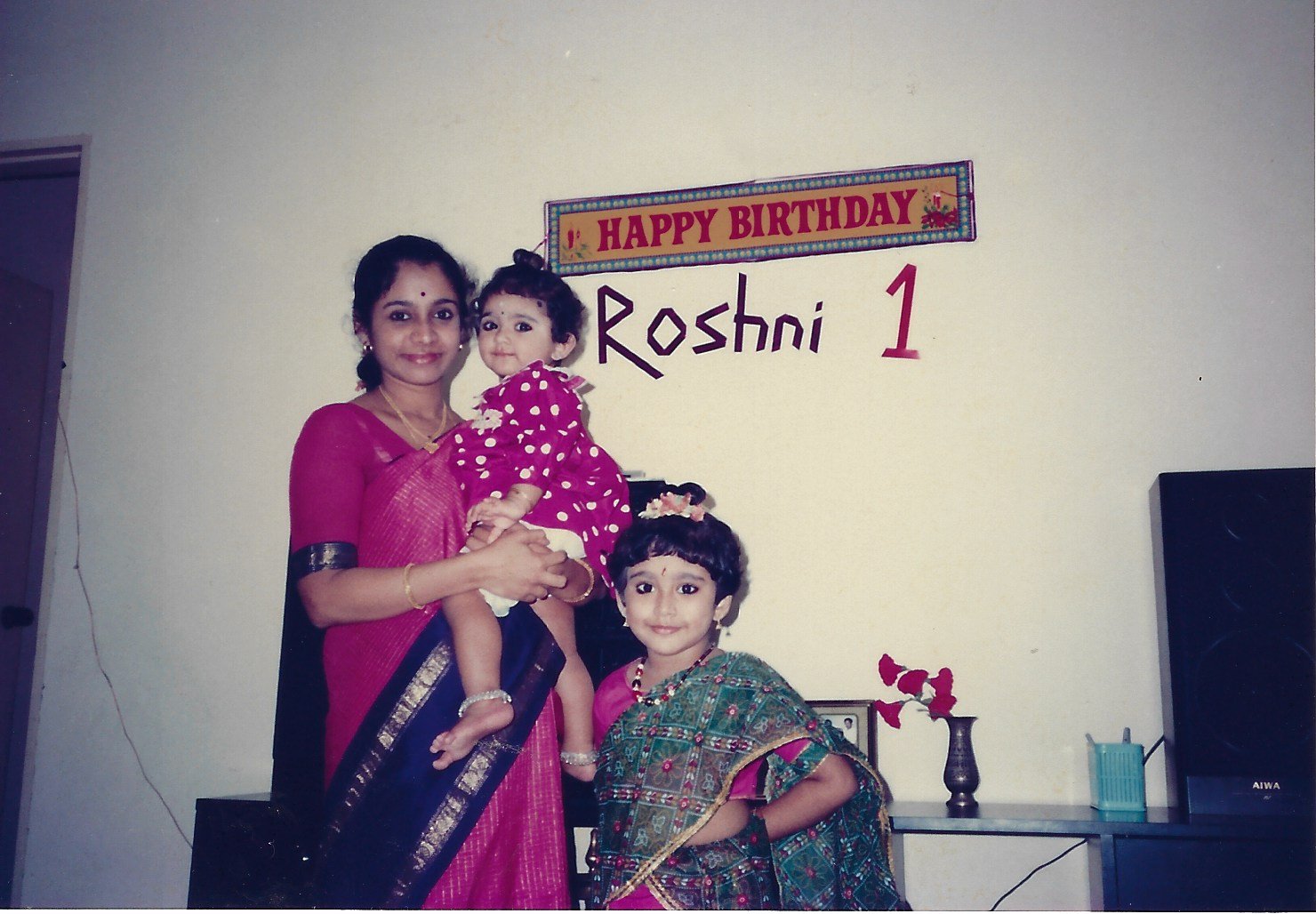
We celebrated my sister’s first birthday in the Serangoon flat. Just recently, we celebrated her own daughter’s first birthday, in May 2022.
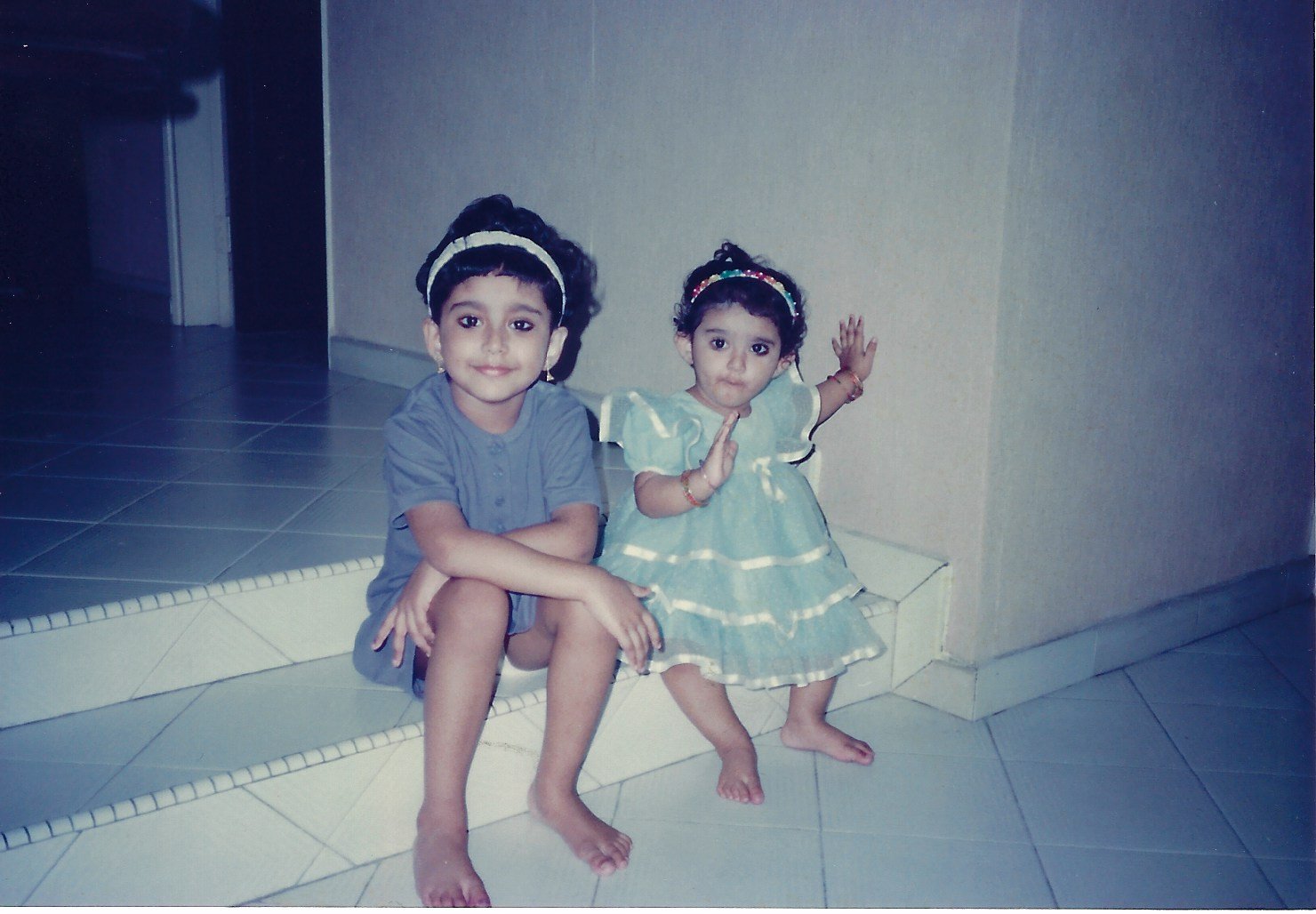
My sister and I in the Yio Chu Kang flat we moved to from Serangoon. It has two small steps separating the living room from the rest of the unit. My sister is wearing the dress I was wearing in the Changi Airport photo.
Kalpana Shivaramakrishnan grew up in Mumbai, India, and has lived in Singapore since 1990.
Aditi Shivaramakrishnan works as an editor, writer, arts manager, and speech-to-text interpreter in Singapore.



